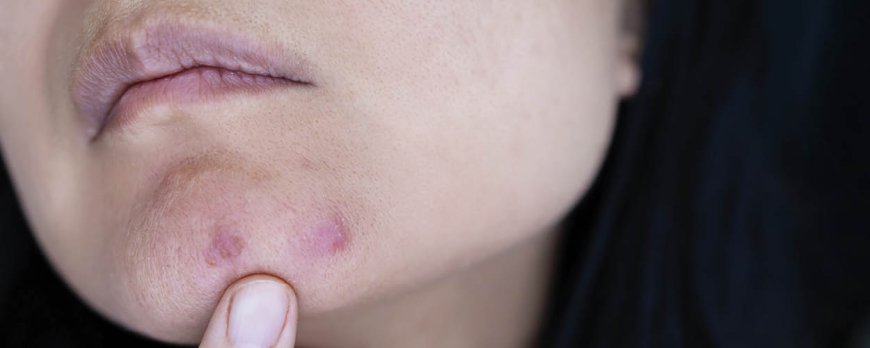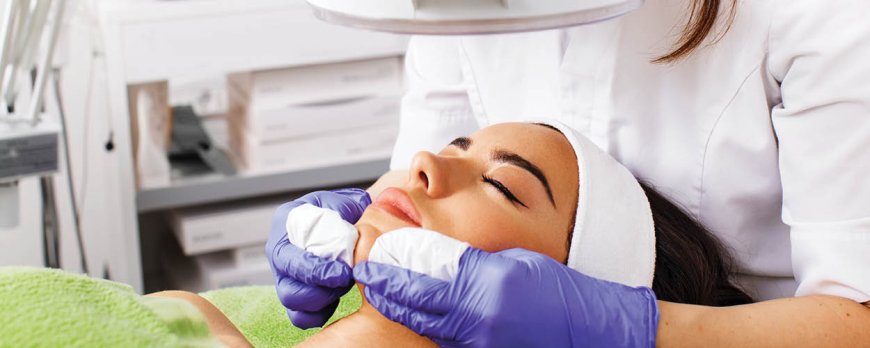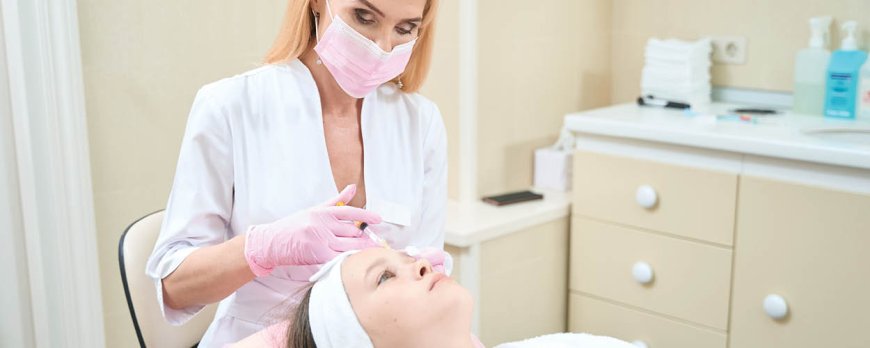What can I do about hormonal acne?
Seeking answers to 'What can I do about hormonal acne?' Explore effective treatments, lifestyle changes, and preventative measures for clearer skin.

What can I do about hormonal acne?
Hormonal acne, a common skin condition caused by hormonal imbalances, can be frustrating to deal with. Find out what you can do to effectively treat and manage it.
Key Takeaways:
- Hormonal acne is caused by excess androgens, leading to the development of pimples, blackheads, whiteheads, cysts, and other types of acne.
- It is most common in adults between the ages of 20 to 50, but can persist through adulthood.
- Hormonal acne typically appears around the lower face and jawline, but may also affect the neck, back, shoulders, and chest.
- Medical treatment options include spironolactone, topical retinoids, and birth control or anti-androgen medications prescribed by a dermatologist.
- Natural remedies such as tea tree oil, alpha hydroxy acid, and green tea may help reduce inflammation.
- A skincare routine tailored to hormonal acne and avoiding triggers like sugar and dairy can also be beneficial.
- Protecting the skin from sun damage is important to prevent hormonal acne.
- If hormonal acne persists, it is recommended to consult a dermatologist for professional guidance.
Understanding Hormonal Acne
Hormonal acne, also known as adult-onset acne, is caused by an excess of androgens, a group of sex hormones. It typically occurs in adults between the ages of 20 to 50 and manifests as pimples, blackheads, whiteheads, cysts, and other types of acne. Hormonal acne is most commonly seen in the late 20s and early 30s but can persist throughout adulthood.
This type of acne is characterized by its location, often appearing around the lower face and jawline. However, it can also show up on the neck, back, shoulders, and chest. While hormonal acne does not usually cause scarring, manipulation of the acne lesions can lead to scarring and hyperpigmentation. It is important to avoid picking or squeezing the acne to prevent these complications.
To effectively address hormonal acne, it is often necessary to seek medical treatment. Birth control pills and anti-androgen medications like spironolactone may be prescribed by a dermatologist to regulate hormone levels and reduce acne flare-ups. Topical retinoids, which are derived from vitamin A, can also be beneficial in improving the appearance of hormonal acne.
In addition to medical treatment, there are natural remedies that can help reduce inflammation and complement medical interventions. Tea tree oil, known for its antimicrobial properties, can be applied topically to reduce acne-causing bacteria. Alpha hydroxy acids, found in skincare products like serums and toners, help exfoliate the skin and unclog pores. Green tea, both consumed as a beverage and used topically, has antioxidant and anti-inflammatory properties that can aid in calming hormonal acne.
It is important to follow a consistent skincare routine tailored to hormonal acne, including gentle cleansing, exfoliating, and moisturizing. Avoiding triggers such as consuming excessive sugar and dairy products can also contribute to the prevention and reduction of hormonal acne. Moreover, protecting the skin from the sun is crucial as some acne medications can make the skin more sensitive to UV radiation.
If hormonal acne persists despite these measures, it is recommended to consult a dermatologist who can provide further guidance and personalized treatment options. Remember, everyone's skin is unique, and a professional opinion can help address individual concerns and achieve clearer, healthier skin.

Medical Treatment Options
Medical interventions such as birth control pills and anti-androgen medications like spironolactone are often prescribed to treat hormonal acne. These medications work by regulating hormone levels in the body, reducing the production of androgens that contribute to acne formation. Birth control pills can be particularly effective for women battling hormonal acne, as they help to stabilize hormone fluctuations that often trigger breakouts.
Another option is the use of topical retinoids, which can help in reducing acne breakouts. Topical retinoids are derived from vitamin A and work by unclogging pores, preventing the formation of new acne, and promoting cell turnover. They have been shown to be effective in reducing inflammation and preventing the formation of acne scars.
Spironolactone
Spironolactone is an oral medication that was originally developed to treat high blood pressure but has been found to be effective in treating hormonal acne. It works by blocking the action of androgens and reducing sebum production, thereby preventing the formation of acne. Spironolactone is commonly prescribed for women with moderate to severe hormonal acne, but it may not be suitable for everyone.
Topical Retinoids
Topical retinoids are available in different strengths and formulations, including creams, gels, and lotions. They work by promoting cell turnover and preventing the clogging of pores, which helps to reduce the formation of acne. Some common topical retinoids include adapalene, tretinoin, and tazarotene. It's important to note that topical retinoids may cause skin dryness, redness, and peeling, especially during the initial stages of treatment.
It is important to consult with a dermatologist to determine the most suitable treatment option for hormonal acne. They can evaluate the severity of the acne and recommend the most appropriate medications or combination therapies to achieve the best results.
Natural Remedies for Hormonal Acne
In addition to medical interventions, there are natural remedies that may help reduce hormonal acne. Tea tree oil, alpha hydroxy acid, and green tea have shown promise in reducing inflammation and improving the appearance of acne-prone skin.
1. Tea tree oil: This essential oil has antimicrobial properties that can help combat acne-causing bacteria. It also acts as an anti-inflammatory, reducing redness and swelling associated with hormonal acne. Dilute a few drops of tea tree oil with a carrier oil like jojoba or coconut oil, and apply it to the affected areas using a cotton swab. Be sure to do a patch test beforehand to check for any adverse reactions.
2. Alpha hydroxy acid (AHA): AHAs, such as glycolic acid and lactic acid, exfoliate the skin and unclog pores, reducing the occurrence of hormonal acne. They also promote cell turnover, leading to a smoother complexion. Look for skincare products containing AHAs and use them as directed to avoid overexfoliation and irritation.
3. Green tea: Green tea is rich in antioxidants and has anti-inflammatory properties that can help reduce hormonal acne. You can brew green tea and apply it to the skin as a toner or incorporate it into your skincare routine by using green tea-infused products. Drinking green tea regularly may also provide additional benefits for your skin.
While these natural remedies have shown promise in managing hormonal acne, it is important to note that results may vary for each individual. It is always best to consult with a dermatologist to determine the most suitable treatment options for your specific skin condition. In addition to these natural remedies, it is essential to maintain a regular skincare routine, avoid triggers that may worsen hormonal acne, and protect your skin from the sun to achieve the best possible results.
Skincare Tips for Hormonal Acne
Establishing a proper skincare routine can play a significant role in managing hormonal acne. Discover effective tips to reduce breakouts and promote healthier skin.
1. Cleanse Regularly
Start your skincare routine by cleansing your face twice a day with a gentle cleanser. Look for a product that is specifically formulated for acne-prone skin and free of harsh chemicals. Avoid scrubbing too harshly, as this can irritate the skin and potentially worsen acne.
2. Use Non-Comedogenic Products
When selecting skincare products, opt for non-comedogenic formulas that won't clog your pores. This includes moisturizers, makeup, and sunscreen. Non-comedogenic products are specially designed to prevent acne breakouts and keep your skin looking clear.
3. Incorporate Topical Treatments
Consider incorporating topical treatments into your skincare routine to target hormonal acne. Look for products containing ingredients like benzoyl peroxide or salicylic acid, which can help unclog pores and reduce inflammation. Apply these treatments as directed, typically after cleansing and before moisturizing.
4. Be Gentle with Exfoliation
Exfoliating can help remove dead skin cells and unclog pores, but be gentle when doing so. Avoid using harsh scrubs, as they can cause irritation and inflammation. Opt for chemical exfoliants like alpha hydroxy acids (AHAs) or beta hydroxy acids (BHAs) instead, which are milder yet effective in promoting skin renewal.
5. Protect Your Skin from the Sun
UV rays can worsen acne and cause post-inflammatory hyperpigmentation, so it's essential to protect your skin from the sun. Apply a broad-spectrum sunscreen with an SPF of 30 or higher every day, even when it's cloudy. Additionally, wear a wide-brimmed hat and seek shade during peak sun hours.
By following these skincare tips, you can help reduce breakouts and improve the overall health of your skin. Remember, it's always a good idea to consult a dermatologist if hormonal acne persists or if you have concerns about your skincare routine.
Lifestyle Changes to Reduce Hormonal Acne
Making certain lifestyle changes can contribute to hormonal balance and minimize the occurrence of acne breakouts. By adopting these key lifestyle adjustments, you can take proactive steps towards managing hormonal acne and promoting clearer, healthier skin.
1. Prioritize Stress Management
Stress can disrupt hormonal balance and trigger acne flare-ups. Incorporating stress management techniques into your daily routine can help reduce the impact of stress on your skin. Consider practicing mindfulness, engaging in regular exercise, and finding activities that help you relax and unwind.
2. Follow a Balanced Diet
Your diet plays a crucial role in hormonal balance and skin health. Incorporate foods rich in antioxidants, such as fruits and vegetables, as well as omega-3 fatty acids found in fish, flaxseeds, and walnuts. Avoid excessive consumption of sugar and processed foods, as they can exacerbate hormonal imbalances and contribute to acne breakouts.
3. Get Sufficient Sleep
Adequate sleep is essential for hormonal regulation and overall well-being. Aim for 7-9 hours of quality sleep each night to support hormone balance and promote healthy skin. Establish a consistent sleep routine and create a sleep-friendly environment to maximize the benefits of your restorative rest.
Remember, while these lifestyle changes can be beneficial in reducing hormonal acne, they may not provide immediate results. It's important to be patient and consistent in implementing these adjustments. If hormonal acne persists or becomes severe, it is always recommended to consult a dermatologist for professional guidance and personalized treatment options.
Identifying Triggers and Avoiding Them
Identifying and avoiding triggers can be crucial in managing hormonal acne. Discover common triggers and learn tips for minimizing their impact on your skin.
Hormonal acne is often influenced by various external factors that can exacerbate breakouts. By identifying these triggers, you can take proactive steps to avoid them and reduce the frequency and severity of hormonal acne flare-ups.
Common Triggers for Hormonal Acne:
- Stress: High levels of stress can disrupt hormone balance, leading to increased androgen production and subsequent acne breakouts. Implement stress management techniques such as exercise, meditation, or engaging in hobbies to help reduce stress levels.
- Diet: Certain foods can trigger hormonal acne in susceptible individuals. Foods high in sugar, refined carbohydrates, and dairy products are commonly associated with acne flare-ups. Opt for a well-balanced diet rich in fruits, vegetables, lean proteins, and whole grains to support clear skin.
- Poor Skincare Habits: Inadequate cleansing, excessive scrubbing, or using harsh products can irritate the skin and worsen hormonal acne. Establish a gentle skincare routine that includes cleansing with a mild cleanser twice a day and using non-comedogenic moisturizers and products.
- Environmental Factors: Exposure to pollutants, high humidity, and excessive sweating can contribute to clogged pores and acne breakouts. Take measures to protect your skin by using non-comedogenic sunscreen, avoiding heavy makeup, and cleansing your face after sweating or being in polluted environments.
Minimizing the impact of these triggers can significantly improve the management of hormonal acne. By making small changes to your lifestyle and skincare routine, you can reduce the frequency and severity of breakouts, leading to clearer and healthier skin.
If you are struggling with hormonal acne, it is advisable to consult a dermatologist who can assess your specific condition and recommend personalized treatment options to effectively address your concerns.

Protecting the Skin from Sun Damage
Sun exposure can exacerbate hormonal acne, making proper sun protection an essential part of acne prevention. Learn how to shield your skin from harmful UV rays.
1. Wear sunscreen: Choose a broad-spectrum sunscreen with an SPF of 30 or higher. Apply it generously to all exposed skin, including your face, neck, and any other areas prone to hormonal acne. Reapply every two hours or more frequently if you are sweating or swimming.
2. Seek shade: Avoid prolonged sun exposure, especially during peak hours when the sun's rays are strongest. Seek shade under umbrellas, trees, or awnings to reduce direct exposure to UV radiation.
3. Wear protective clothing: Cover your skin with lightweight, breathable clothing that provides coverage and blocks UV rays. Opt for long-sleeved shirts, wide-brimmed hats, and sunglasses with UV protection.
4. Avoid tanning beds: Tanning beds emit UVA and UVB rays that can damage the skin and worsen hormonal acne. It's best to avoid them entirely to protect your skin and reduce the risk of developing skin cancer.
Remember: While protecting your skin from the sun is crucial, it's important to note that sun protection alone may not completely treat hormonal acne. It is recommended to follow a comprehensive acne prevention plan that includes medical treatments, natural remedies, skincare tips, and lifestyle changes.
Conclusion
Dealing with hormonal acne can be challenging, but with the right treatments, lifestyle changes, and preventative measures, you can achieve clearer skin. It's important to remember that hormonal acne is a common skin condition that affects many adults between the ages of 20 to 50. Understanding its causes and seeking appropriate treatment is key to managing this condition.
If you're struggling with hormonal acne, it's advisable to consult a dermatologist who can provide professional guidance. They may prescribe medications such as spironolactone or topical retinoids to help control hormonal acne. Over-the-counter products are generally not effective for hormonal acne, so it's best to seek medical advice.
In addition to medical treatments, natural remedies like tea tree oil, alpha hydroxy acid, and green tea can be beneficial in reducing inflammation associated with hormonal acne. Incorporating these remedies into your skincare routine can complement medical treatments and help in achieving clearer skin.
To further manage hormonal acne, it's important to adopt a skincare routine tailored to your specific needs. This can include gentle cleansing, avoiding harsh products, and using non-comedogenic moisturizers. Additionally, identifying triggers like sugar and dairy in your diet and making dietary adjustments can help reduce the occurrence of hormonal acne.
Lastly, protecting your skin from the sun is crucial in preventing hormonal acne. Sun exposure can aggravate acne and cause hyperpigmentation, so it's essential to use sunscreen with a high SPF and wear protective clothing when outdoors.
In conclusion, while hormonal acne can be frustrating, there are various treatments, lifestyle changes, and preventative measures that can help improve your skin's condition. Remember to consult a dermatologist if hormonal acne persists despite your efforts, as they can provide personalized advice based on your unique situation.
FAQ
What causes hormonal acne?
Hormonal acne is caused by excess androgens, a group of sex hormones, which lead to the development of acne such as pimples, blackheads, whiteheads, cysts, and other types of acne.
At what age does hormonal acne typically occur?
Hormonal acne is most common in the late 20s and early 30s but may persist through adulthood.
Where does hormonal acne typically appear on the body?
Hormonal acne typically appears around the lower face and jawline but can also show up on the neck, back, shoulders, and chest.
Can hormonal acne cause scarring?
Although hormonal acne does not usually cause scarring, it can if manipulated.
What treatments are available for hormonal acne?
Medical treatment options for hormonal acne include birth control and anti-androgen medications like spironolactone. Topical retinoids may also be beneficial.
Do over-the-counter products work for hormonal acne?
Over-the-counter products are usually not effective for hormonal acne. However, natural treatments like tea tree oil, alpha hydroxy acid, and green tea may help reduce inflammation.
What skincare routine should I follow for hormonal acne?
It's important to follow a skincare routine that includes cleansing, exfoliating, and moisturizing. Using products specifically designed for acne-prone skin can also help.
Are there any lifestyle changes that can help reduce hormonal acne?
Yes, making certain lifestyle changes such as managing stress, getting enough sleep, and exercising regularly can help balance hormones and reduce hormonal acne.
How can I identify triggers for hormonal acne?
Paying attention to your diet, stress levels, and skincare products can help you identify triggers for hormonal acne. Keeping a diary of your symptoms and flare-ups may also be helpful.
Why is it important to protect the skin from the sun to prevent hormonal acne?
Sun exposure can trigger inflammation and worsen hormonal acne. Therefore, it's important to use sunscreen and avoid excessive sun exposure to prevent flare-ups.




























































































































